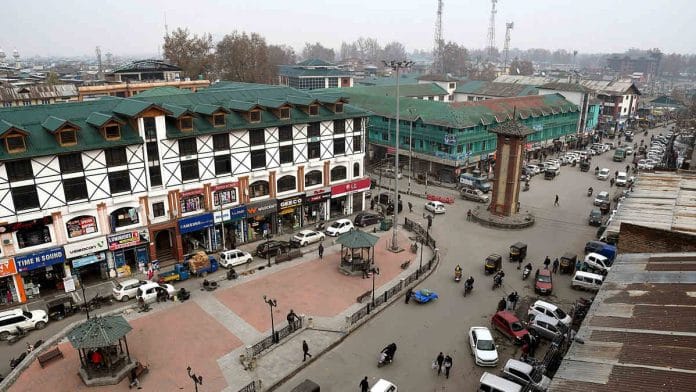Srinagar: The Jammu and Kashmir High Court has sought details of the expenditure incurred and security arrangements made for the Darbar Move, a 148-year-old tradition in which the capital of the region is relocated twice a year — from Srinagar to Jammu during winter months and vice versa in the summers.
The region has two capitals — Jammu and Srinagar. Under the exercise, the civil secretariat, important subsidiary offices and the assembly (essentially the Capital of the erstwhile state) are made operational in Srinagar for the six months in summer and in Jammu for the entirety of winter. .
The administration of the newly created UT on Friday, however, said that in view of the Covid-19 pandemic, offices will open in Srinagar as part of biennial Darbar Move on 4 May but the civil secretariat in Jammu will continue to remain functional.
The government also ordered that the employees of Kashmir will be the only ones to move to the Valley this year, while employees belonging to the Jammu division serving in such offices will work on an “as is where is” basis.
“Employees of the Kashmir Division, who are required to move to Srinagar on account of Darbar Move on April 25-26 will be provided transport facility,” the government order said.
Also read: J&K High court stays cutting down distinctive 16-20 million Russian poplar trees
Petition challenges move in HC
Following this, however, a plea was filed in the high court with the petitioners contending that the government decision required a serious judicial review.
The petition contended that the move would cause an “unbearable strain on all facilities in the Valley”, could deeply endanger the health and even lives of the locals, cause unnecessary squandering of financial resources and would critically impact Covid-19 concerns in Srinagar and result in immediate dilution of the already scarce resources of the union territory.
The high court has now sought details of the last four Darbar Moves in 2018 and 2019, including security arrangements made for the process, the expenditure incurred on transportation and accommodation of government employees and financial benefits in the form of move allowance given to employees.
“In order to enable a considered view to be taken, it is necessary to have firm information with regard to the implications of the Darbar Move in these times; its impact on the necessary resources at this stage; on the personnel involved (positions and number); financial implications; arrangements (transport, accommodation, security etc) involved and other relevant matters. Past experience would lend guidance to our consideration,” said the High Court while listening to the petition which is one among several other matters related to Covid-19 issues that are currently being heard by Judge Rajnesh Oswal and Chief Justice Gita Mittal.
The court has asked the government to provide information of the rate wise and total expenses which were incurred in hiring facilities for making available accommodation to the personnel who had to make the four moves between Jammu and Srinagar.
Also read: Many in J&K’s Sopore booked for lockdown violation as they attend Jaish militant’s funeral
What is the Darbar Move?
The annual move from Srinagar to Jammu usually takes place in October and encompasses moving of files and government documents. The practice was started by Dogra king Maharaja Ranbir Singh in 1872 to escape the harsh winters of the Kashmir valley.
As part of the exercise, official documents and other equipment are packed in hundreds of bundles, cartons and metallic trunks and loaded into over 200 trucks in Srinagar for the over 300 km trip to Jammu.
After the Narendra Modi government scrapped Article 370 on 5 August and bifurcated J&K into two union territories, there was uncertainty on whether the annual exercise would take place. But the new administration went through with it in October.
Also read: ‘Ease border lockdown, let us get home’ — J&K students stranded in Pakistan seek help
Move draws flak
The administration’s recent decision to allow the relocation back from Jammu to Srinagar has drawn criticism from various quarters in Kashmir including the political circles.
Recently released former J&K CM Omar Abdullah took to Twitter to express his anguish.
“This order regarding the bi-annual “durbar move” is just mindless rubbish at worst & needless tokenism at best. So the offices can’t shift to Srinagar because of #Covid_19, I get that. What I don’t get is what Srinagar secretariat will do without files or senior officers?” he tweeted Friday.
“This order of two “functioning secretariats” will just create confusion because no one will know which secretariat to approach to get their work done. It would be better to withdraw this order & just delay the move of offices till the #Covid_19 threat has passed,” he added.
On Saturday he took to Twitter again.
“1.If it safe for Kashmiri employees to move to Srinagar why not Jammuites? 2. If the files remain in Jammu what work will the Kashmiri employees do in the Srinagar secretariat? If the files move to Srinagar what work will be done in Jammu?” he tweeted. “3. Why do non-J&K employees and officers lead by the LG of J&K not move to the valley as scheduled? What is the reason for them to continue to stay on in Jammu?.”






